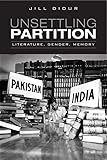Unsettling partition : literature, gender, memory / Jill Didur.
Material type: TextPublication details: [S.l.] : University of Toronto Press, Scholarly Publishing Division, 2006.Edition: 1st edDescription: 220 p. ; 24 cmISBN:
TextPublication details: [S.l.] : University of Toronto Press, Scholarly Publishing Division, 2006.Edition: 1st edDescription: 220 p. ; 24 cmISBN: - 0802079970 (hardcover)
- 9780802079978 (hardcover)
| Item type | Current library | Collection | Call number | Status | Barcode | |
|---|---|---|---|---|---|---|
 Book
Book
|
Air University Central Library Islamabad | NFIC | 823.9140995422 DID (Browse shelf(Opens below)) | Available | P8968 |
The Partition of India in 1947 marked the birth of two modern nation-states and the end of British colonialism in South Asia. The move towards the 'two nation solution' was accompanied by an unprecedented mass migration (over twelve million people) to and from areas that would become India and Pakistan. Diverse representations of the violence that accompanied this migration (including the abduction and sexual assault of over 75,000 women) can be found in fictional, historical, autobiographical, and recent scholarly works. Unsettling Partition examines short stories, novels, testimonies, and historiography that represent women's experiences of the Partition. Counter to the move for 'recovery' that informs some historical research on testimony and fictional representations of women's Partition experiences, Jill Didur argues for an attentiveness to the literary qualities of women's narratives that interrogate and unsettle monolithic accounts of the period. Rather than attempt to seek out a 'hidden history' of this time, Didur examines how the literariness of Partition narratives undermines this possibility. Unsettling Partitions reinterprets the silences found in women's accounts of sectarian violence that accompanied Partition (sexual assault, abduction, displacement from their families) as a sign of their inability to find a language to articulate their experience without invoking metaphors of purity and pollution. Didur argues that these silences and ambiguities in women's stories should not be resolved, accounted for, translated, or recovered but understood as a critique of the project of patriarchal modernity.
There are no comments on this title.

